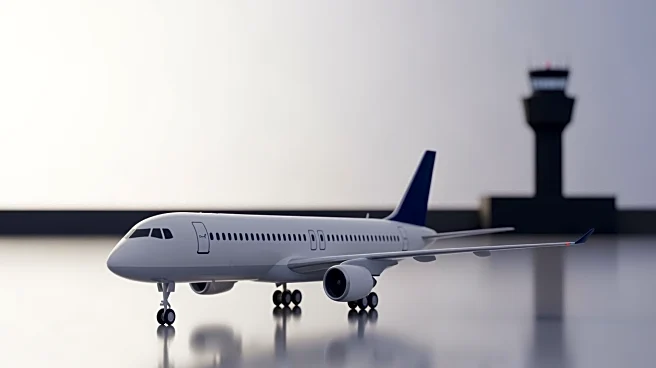What's Happening?
Delta Air Lines announced the cancellation of approximately 170 flights scheduled for Friday, November 7, in response to the Federal Aviation Administration's directive to reduce air traffic by 10% across
40 high-traffic airports in the United States. This decision comes as the federal government shutdown continues into its sixth week, affecting various sectors including transportation. Delta aims to maintain access to all cities it currently serves and is proactively contacting affected customers to offer flexibility in changing, canceling, or refunding their flights without penalty. Despite the cancellations, Delta plans to operate the majority of its flights as scheduled, prioritizing long-haul international services while ensuring safety and minimizing customer impact.
Why It's Important?
The reduction in flight operations highlights the significant impact of the ongoing government shutdown on the U.S. transportation system. The FAA's directive is a direct consequence of congressional gridlock, affecting airlines, workers, and travelers, especially as the holiday travel season approaches. The cancellations underscore the broader economic and safety concerns associated with the shutdown, as air traffic controllers continue to work without pay. This situation poses challenges for airlines in managing operations and maintaining consumer confidence, potentially leading to further disruptions in travel plans and economic activities.
What's Next?
The restoration of normal air traffic operations is contingent upon resolving the federal government funding impasse. If Congress fails to reach a budget agreement soon, stakeholders anticipate even greater disruptions. Travelers are advised to stay informed through airline communications, utilize digital tools for rebooking, and remain flexible as the situation evolves. The timeline for resolving these issues remains uncertain, with potential implications for travel delays and broader economic impacts.
Beyond the Headlines
The ongoing government shutdown and its impact on air travel raise ethical and political questions about the responsibilities of government officials in ensuring public safety and economic stability. The situation also highlights the vulnerability of critical infrastructure to political stalemates, prompting discussions on the need for contingency planning and resilience in essential services.










